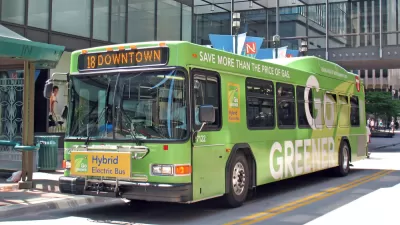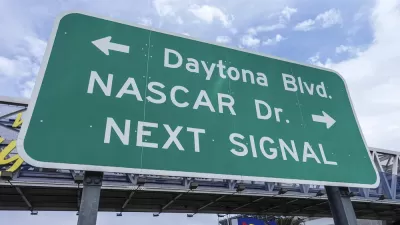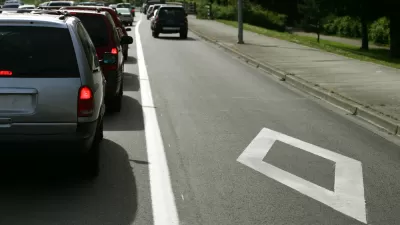The effect of low gas prices on motor vehicle selection by consumers could set back President Barack Obama's climate legacy, which includes obtaining fuel economy standards of 54.5 mpg by 2025.
Low gas prices resulting from "a nearly 44% slide in oil prices since June... has sent the average price of gasoline to around $2.40 a gallon, according to the U.S. Energy Information Administration (EIA), "write Josh Mitchell and Amy Harder in The Wall Street Journal.
One result—vehicle selection. Rather than fuel efficient compact cars, "Americans are again favoring sport-utility vehicles and trucks, which made up 52% of all auto sales in October, up from 49% a year earlier and 44% in October 2008 after gas prices took an abrupt increase, according to Kelley Blue Book," they add. [See difference between April 2008 and just a year later.]
Fuel economy of new vehicles sold has increased for the last seven years, but slipped to 25.3 mpg in September "like the old days." According to Michal Sivak, director of sustainable world-wide transportation at the University of Michigan Transportation Research Institute, fuel economy stayed "flat in October and November, despite the rollout of model-year 2015 vehicles that on average get higher mileage than prior model years," write Mitchell and Harder.
“Vehicle buyers are very sensitive to the changes in the price of gas,” Mr. Sivak said. “When the price of gas goes down, so does their interest in fuel-efficient vehicles. This is especially the case if the change in the price of gas is rapid, as was the case this fall.”
"The national program measuring fuel economy isn’t based on what we produce, but on what consumers choose to buy," according to the Alliance of Automobile Manufacturers. The Center for Climate and Energy Solutions (C2ES) spells out the two rules the auto industry is facing:
The first rule, adopted in April 2010, raises the average fuel economy of new passenger vehicles to 34.1 miles per gallon (mpg) for model year 2016, a nearly 15 percent increase from 2011. The second rule, finalized in August 2012, will raise average fuel economy to up to 54.5 mpg for model year 2025, for a combined increase of more than 90 percent over 2011 levels.
Mitchell and Harder also point to flagging sales of electric vehicles (EVs), down 3.7 percent from last year according to the Electric Drive Transportation Association trade group, although a recent post here is not as pessimistic. Conventional hybrid vehicle sales may be feeling the pinch more.
Most importantly, Mitchell and Harder note that the cheapest gas prices in five years can't be entirely blamed for the vehicle selection and decrease in fuel economy. U.S. energy and transportation policy—based on low federal gas taxes that haven't increased in 21 years and don't appear likely to be increased in the foreseeable future despite a soon-to-be insolvent Highway Trust Fund—may be at the heart of it.
The developments highlight the difficulty of designing long-term policies around volatile crude-oil and gasoline prices. They also point to a long-standing reality in American energy policy: Even before the latest price drop, gasoline has long been far cheaper than in advanced economies in Europe and Asia, making it tough to promote alternatives.
Correspondent's note: Subscriber-only content of the three, Dec. 30 Wall Street Journal articles should be available to non-subscribers for up to seven days after December 30, 2014.
FULL STORY: For Policy Makers, Downside to Cheap Gas

Planetizen Federal Action Tracker
A weekly monitor of how Trump’s orders and actions are impacting planners and planning in America.

Restaurant Patios Were a Pandemic Win — Why Were They so Hard to Keep?
Social distancing requirements and changes in travel patterns prompted cities to pilot new uses for street and sidewalk space. Then it got complicated.

Map: Where Senate Republicans Want to Sell Your Public Lands
For public land advocates, the Senate Republicans’ proposal to sell millions of acres of public land in the West is “the biggest fight of their careers.”

Maui's Vacation Rental Debate Turns Ugly
Verbal attacks, misinformation campaigns and fistfights plague a high-stakes debate to convert thousands of vacation rentals into long-term housing.

San Francisco Suspends Traffic Calming Amidst Record Deaths
Citing “a challenging fiscal landscape,” the city will cease the program on the heels of 42 traffic deaths, including 24 pedestrians.

California Homeless Arrests, Citations Spike After Ruling
An investigation reveals that anti-homeless actions increased up to 500% after Grants Pass v. Johnson — even in cities claiming no policy change.
Urban Design for Planners 1: Software Tools
This six-course series explores essential urban design concepts using open source software and equips planners with the tools they need to participate fully in the urban design process.
Planning for Universal Design
Learn the tools for implementing Universal Design in planning regulations.
Heyer Gruel & Associates PA
JM Goldson LLC
Custer County Colorado
City of Camden Redevelopment Agency
City of Astoria
Transportation Research & Education Center (TREC) at Portland State University
Camden Redevelopment Agency
City of Claremont
Municipality of Princeton (NJ)





























